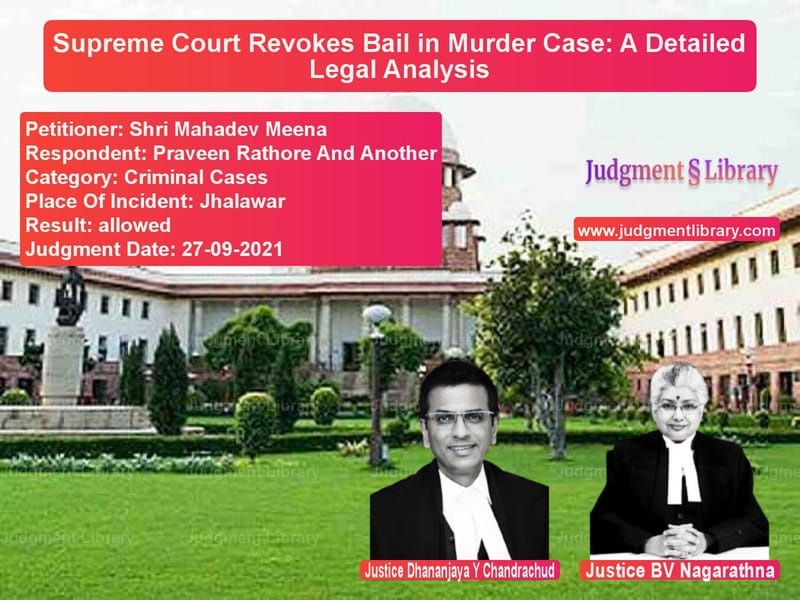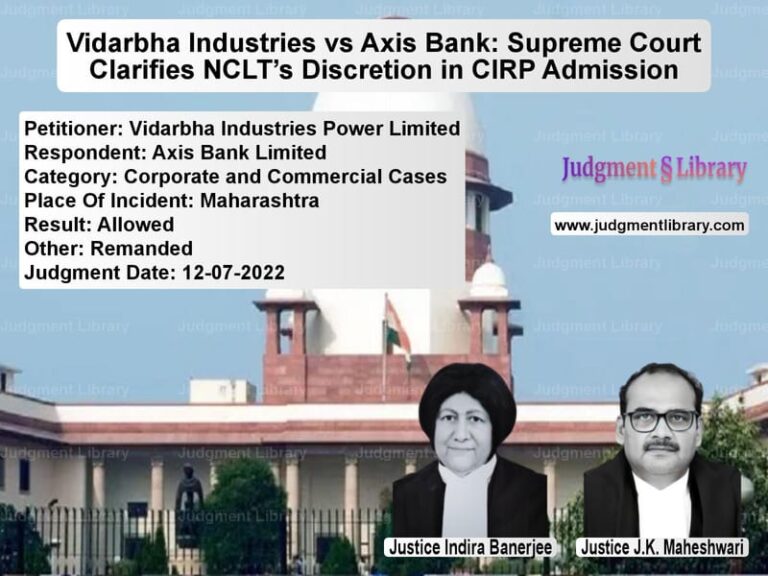Supreme Court Revokes Bail in Murder Case: A Detailed Legal Analysis
The present case involves the tragic death of the appellant’s son, an Intelligence Bureau officer, under suspicious circumstances. This case raises crucial legal issues regarding the grant of bail in serious criminal cases, the evaluation of circumstantial evidence, and the role of law enforcement in investigating complex murder conspiracies.
The appellant, Shri Mahadev Meena, filed an appeal against the judgment of the Rajasthan High Court, which had granted bail to the first respondent, Praveen Rathore, an employee of the Anti-Corruption Bureau. The case revolves around allegations that the deceased was murdered as part of a conspiracy involving his wife, Anita Meena, and other co-accused individuals. The Supreme Court analyzed the evidence presented and concluded that the High Court erred in granting bail, thereby setting aside the impugned order.
Background of the Case
The deceased, a Senior Technical Officer with the Intelligence Bureau, was married to Anita Meena. The couple had two children. On February 14, 2018, he traveled from New Delhi to Jhalawar and was later found unconscious near a railway crossing. He was declared dead upon arrival at the hospital. His father, the appellant, reported the incident, leading to an investigation under Section 174 of the CrPC.
The initial post-mortem report did not conclusively establish the cause of death. However, subsequent forensic investigations revealed the presence of Ketamine, a powerful anesthetic drug, in the deceased’s viscera. This led to allegations of a planned murder involving the deceased’s wife and her alleged acquaintance, Praveen Rathore.
Investigation and Key Evidence
The prosecution presented significant evidence linking the accused to the crime:
- Call data records indicated continuous communication between the accused on the day of the incident.
- Witnesses stated that the first respondent was seen near the crime scene.
- A recovered diary belonging to a co-accused mentioned the delivery of Ketamine vials to the first respondent.
- Ketamine and a syringe were recovered at the instance of the co-accused.
- The mobile phone of the deceased’s wife contained records of frequent communication with the first respondent.
Based on this evidence, the police filed an FIR under Sections 302 (murder) and 120B (criminal conspiracy) of the IPC. The charge sheet implicated the first respondent as a key conspirator.
High Court’s Grant of Bail
Despite the serious nature of the allegations, the High Court granted bail to the first respondent, citing the following reasons:
- The first respondent had been in custody for over two years.
- Only 25 out of 76 witnesses had been examined.
- The prosecution initially failed to detect Ketamine in the forensic examination.
- The co-accused had already been granted bail.
The High Court’s decision was challenged in the Supreme Court, with the appellant arguing that the lower court failed to consider the gravity of the crime.
Supreme Court’s Analysis and Decision
The Supreme Court, comprising Justices Dr. Dhananjaya Y Chandrachud and BV Nagarathna, critically examined the High Court’s order and found significant flaws in its reasoning.
Key Observations of the Supreme Court
The apex court emphasized the following points:
- Seriousness of the Offense: The nature of the crime warranted a stricter approach towards bail.
- Role of the Accused: The first respondent, being an employee of the Anti-Corruption Bureau, had the means to influence witnesses.
- Delay in FIR: The delay was justified given the reluctance of the police to register the case.
- Parole vs. Parity: The co-accused, Anita Meena, was granted bail on humanitarian grounds due to her infant child. This could not be used to justify bail for the first respondent.
- Presence of Ketamine: The presence of the drug in the deceased’s viscera was a crucial piece of evidence that could not be ignored.
Legal Precedents Considered
The court referred to several landmark judgments to guide its decision:
- Ram Govind Upadhyay v. Sudharshan Singh: This case established that courts must consider the severity of punishment and the nature of the crime while granting bail.
- Prasanta Kumar Sarkar v. Ashis Chatterjee: This ruling emphasized that bail should not be granted when there is a reasonable apprehension of the accused influencing witnesses.
- Ramesh Bhavan Rathod v. Vishanbhai Hirabhai Makwana: The judgment highlighted that parity in bail must be evaluated based on the accused’s role in the crime.
Final Judgment
The Supreme Court overturned the bail order and directed the first respondent to surrender immediately. The judgment reinforced the principles governing bail in serious criminal cases, emphasizing that courts must exercise discretion judiciously.
This case sets a precedent for handling bail applications in murder cases, underscoring the importance of evaluating circumstantial evidence comprehensively.
Petitioner Name: Shri Mahadev Meena.Respondent Name: Praveen Rathore And Another.Judgment By: Justice Dhananjaya Y Chandrachud, Justice BV Nagarathna.Place Of Incident: Jhalawar.Judgment Date: 27-09-2021.
Don’t miss out on the full details! Download the complete judgment in PDF format below and gain valuable insights instantly!
Download Judgment: shri-mahadev-meena-vs-praveen-rathore-and-supreme-court-of-india-judgment-dated-27-09-2021.pdf
Directly Download Judgment: Directly download this Judgment
See all petitions in Bail and Anticipatory Bail
See all petitions in Murder Cases
See all petitions in Extortion and Blackmail
See all petitions in Judgment by Dhananjaya Y Chandrachud
See all petitions in Judgment by B.V. Nagarathna
See all petitions in allowed
See all petitions in supreme court of India judgments September 2021
See all petitions in 2021 judgments
See all posts in Criminal Cases Category
See all allowed petitions in Criminal Cases Category
See all Dismissed petitions in Criminal Cases Category
See all partially allowed petitions in Criminal Cases Category







